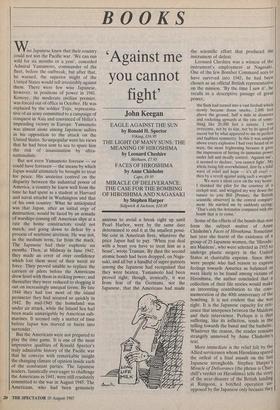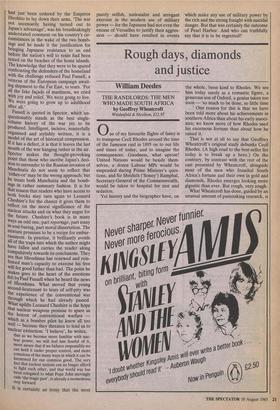BOOKS
`Against me you cannot fight'
John Keegan
EAGLE AGAINST THE SUN by Ronald H. Spector
Viking, f16.95
THE LIGHT OF MANY SUNS: THE MEANING OF HIROSHIMA by Leonard Cheshire
Methuen, f7.95
FACES OF HIROSHIMA by Anne Chisholm
Cape, £9.95
MIRACLE OF DELIVERANCE: THE CASE FOR THE BOMBING OF HIROSHIMA AND NAGASAKI by Stephen Harper Wise Japanese knew that their country could not win the Pacific war. 'We can run wild for six months or a year', conceded Admiral Yamamoto, commander of the fleet, before the outbreak; but after that, he warned, the superior might of the United States would tell irresistibly against them. There were few wise Japanese, however, in positions of power in 1941. Konoye, the moderate civilian premier, was forced out of office in October. He was replaced by the soldier Tojo, representa- tive of an army committed to a campaign of conquest in Asia and convinced of Hitler's impending victory in Europe. Yamamoto was almost alone among Japanese sailors in his opposition to the attack on the United States. So unpopular were his views that he had been sent to sea to spare him the risk of assassination by ultra- nationalists.
But not even Yamamoto foresaw — or could have foreseen — the means by which Japan would ultimately be brought to treat for peace. His anxieties centred on the disparity between the industrial power of America, a country he knew well from the time he had spent as a student at Harvard and naval attache in Washington and that of his own country. What he anticipated was that Japan, after an initial orgy of destruction, would be faced by an armada of warships coming off American slips at a rate the home constructors could not match, and going down to defeat by a process of maritime attrition. He was not, in the medium term, far from the mark. The Japanese had their euphoric six months. Then, at Midway in June 1942, they made an error of over confidence which lost them most of their naval air force. They proved unable to replace the carriers or pilots before the Americans drew level with them in striking power; and thereafter they were reduced to slogging it out on increasingly unequal terms. By late 1944 they had lost most of the island perimeter they had secured so quickly in 1942. By mid-1945 the homeland was under air attack, while the Inland Sea had been made unnavigable by American sub- marines. It seemed only a matter of time before Japan was starved or burnt into surrender.
But the Americans were not prepared to play the time game. It is one of the most impressive qualities of Ronald Spector's truly admirable history of the Pacific war that he conveys with remarkable insight the changing climate of opinion inside each of the combatant parties. The Japanese leaders, fanatically over-eager to challenge the Americans in 1941, were still resolutely committed to the war in August 1945. The Americans, who had been genuinely
Sidgwick & Jackson, £10.95
anxious to avoid a break right up until Pearl Harbor, were by the same date determined to end it at the smallest possi- ble cost in American lives, whatever the price Japan had to pay. 'When you deal with a beast you have to treat him as a beast', wrote Truman. By then the second atomic bomb had been dropped, on Naga- saki, and all but a handful of super-patriots among the Japanese had recognised that they were beaten. Yamamoto had been proved right; though, ironically, it was from fear of the Germans, not the Japanese, that the Americans had made the scientific effort that produced the instrument of defeat.
Leonard Cheshire was a witness of the instrument's employment at Nagasaki. One of the few Bomber Command aces to have survived into 1945, he had been chosen as an official British representative on the mission. 'By the time I saw it', he recalls in a descriptive passage of great power, the flash had turned into a vast fireball which slowly became dense smoke, 2,000 feet above the ground, half a mile in diameter and rocketing upwards at the rate of some- thing like 20,000 feet a minute. I was overcome, not by its size, nor by its speed of ascent but by what appeared to me its perfect and faultless symmetry. In this it was unique above every explosion I had ever heard of or seen, the more frightening because it gave the impression of having its immense power under full and deadly control. 'Against me', it seemed to declare, you cannot fight'. My whole being felt overwhelmed, first by a tidal wave of relief and hope — it's all over! — then by a revolt against using such a weapon . . . We were a silent crew on the way home. I thanked the pilot for the courtesy of a cockpit seat, and wriggled my way down the tunnel to join Bill [Penney, the British scientific observer] in the central compart- ment. He startled me by suddenly saying: `That's only the detonator compared with the bomb that is to come.'
Some of the effects of the bomb-that-was form the subject matter of Anne Chisholm's Faces of Hiroshima. Sometime last year she learnt of the existence of a group of 25 Japanese women, the 'Hiroshi- ma Maidens', who were selected in 1955 to undergo plastic surgery in the United States at charitable expense. Since they were people who had reason to express feelings towards America as balanced as were likely to be found among victims of Hiroshima, the author concluded that a collection of their life stories would make an interesting contribution to the com- memoration of the 40th anniversary of the bombing. It is not evident that she was right. It is the Japanese capacity for reti- cence that interposes between the Maidens and their interviewer. Perhaps it is that suffering, like its infliction, tends in the telling towards the banal and the bathetic. Whatever the reason, the reader remains strangely unmoved by Anne Chisholm's text.
More immediate is the relief felt by the Allied servicemen whom Hiroshima spared the ordeal of a final assault on the last Japanese strongholds. Stephen Harper's Miracle of Deliverance (the phrase is Chur- chill's verdict on Hiroshima) tells the story of the near-disaster of the British landing at Rangoon, a botched operation un- opposed by the Japanese only because they had just been ordered by the Emperor Hirohito to lay down their arms. 'The war not necessarily having turned out to Japan's advantage', was his breathtakingly understated comment on his country's cir- cumstances in the wake of the two bomb- ings and he made it the justification for bringing Japanese resistance to an end before the nation's will to resist had been tested on the beaches of the home islands. The knowledge that they were to be spared confronting the defenders of the homeland with the challenge reduced Paul Fussell, a veteran of the European campaign await- ing shipment to the Far East, to tears. 'For all the fake façade of manliness, we cried with joy and relief. We were going to live. We were going to grow up to adulthood after all.'
Fussell is quoted in Spector, which un- questionably stands as the best single- volume history of the war yet to be produced. Intelligent, incisive, masterfully organised and stylishly written, it is a model of the art of historical compression. If it has a defect, it is that it leaves the last month of the war hanging rather in the air. Spector makes the thought-provoking point that those who ascribe Japan's deci- sion to surrender to the Russian invasion of Manchuria do not seem to reflect that `either-or' may be the wrong approach; but he treats both Manchuria and the bomb- ings in rather summary fashion. It is for that reason that readers who have access to both books may turn again to Leonard Cheshire's for the chance it gives them to reflect on the moral significance of the nuclear attacks and on what they augur for the future. Cheshire's book is in many Ways an odd one, part reportage, part essay in soul-baring, part moral dissertation. The mixture promises to be a recipe for embar- rassment. In practice, it brilliantly avoids
all of the traps into which the author might have fallen and carries the reader along compulsively towards its conclusions. They are that Hiroshima has renewed and rein- forced man's capacity to exercise his free will for good father than bad. The point he makes goes to the heart of the emotions felt by Paul Fussell when he heard the news of Hiroshima. What moved that young
second-lieutenant to tears of self-pity was
the experience of the conventional war through which he had already passed. What uplifts Leonard Cheshire is the hope that nuclear weapons promise to spare us the horror of conventional warfare —
which as a bomber pilot he knew all too well — because they threaten to lead us to nuclear extinction. 'I believe', he writes,
that as we become more familiar with nuc- lear power, we will feel less fearful of it, more aware that if we behave responsibly we can hold it under proper control, and more conscious of the many ways in which it can be harnessed for our common good. The very fact that nuclear nations can no longer afford to fight each other, and that world war has been relegated to what Pope John movingly calls 'the tragic past', is already a momentous step forward.
It is certainly an irony that the most purely selfish, nationalist and arrogant exercise in the modern use of military power — for the Japanese had not even the excuse of Versailles to justify their aggres- sion — should have resulted in events which make any use of military power by the rich and the strong fraught with suicidal danger. But that was certainly the outcome of Pearl Harbor. And who can truthfully say that it is to be regretted?











































 Previous page
Previous page